The Most Reliable Compact Washers and Dryers for 2026
December 23rd, 2025 | 9 min. read
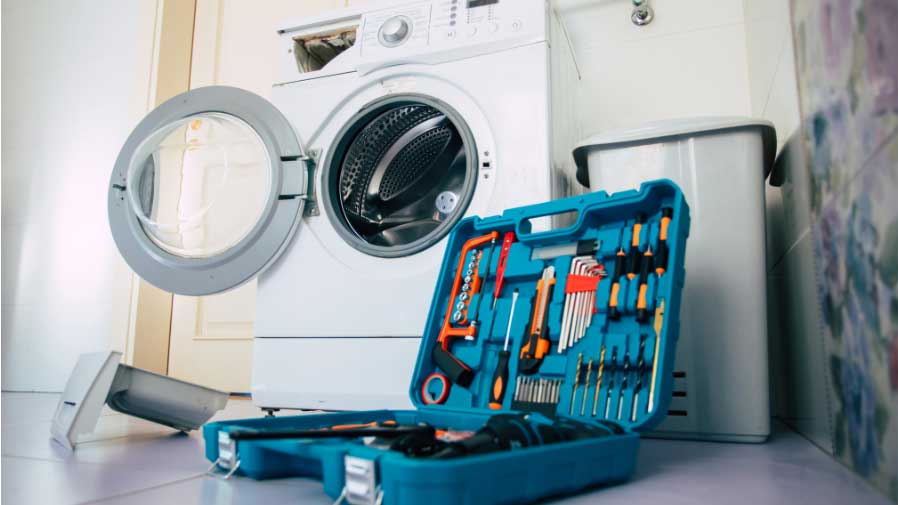
TL;DR: The Most Reliable Compact Washers and Dryers for 2026
Compact washers and dryers can be reliable, but the real risk is service, not the failure rate, especially with heat pump dryers that most techs cannot repair.
Based on 33,000+ service calls, LG and Bosch are the most reliable compact washers (4.1% and 5.2%), while Miele is the most reliable compact dryer (6.8%).
Before you buy, confirm your electrical setup and local heat pump service, because a “reliable” machine is not reliable if no one can fix it.
Compact washers and dryers are some of the most advanced appliances you can buy.
They are also some of the hardest to repair. Heat pump dryers use sealed systems with compressors and evaporators, so most technicians are not trained to fix them.
That is the real reliability problem. A machine can be reliable on paper, but if it breaks and no one can fix it, it is not reliable for you.
In this article, you will see the most reliable compact washers and dryers based on over 33,000 service calls logged by our team last year.
You will also learn what tends to fail, why compact dryers cost more to repair, and how to choose a set you can actually get serviced.
📌 Skip Ahead:
- What This Article Covers
- Check Your Electrical Before You Buy
- How We Measure Reliability
- Most Reliable Compact Washers
- Common Washer Repairs
- Most Reliable Compact Dryers
- Why Heat Pump Dryers Are Hard to Repair
- Combo Washer Dryers: Worth It or Not
- How Long Compact Laundry Lasts
- Conclusion
- Frequently Asked Questions
What You’ll Actually Learn About Compact Washers and Dryers (Before You Buy)
| What You will Learn | |
| Why compact reliability is different | Heat pumps, sealed systems, and why repairs are harder |
| Washer reliability | Fail rates for LG, Bosch, and Miele |
| Dryer reliability | Why heat pump dryer repair skills matter |
| Common failures | Door locks, dispensers, clogged hoses |
| Service traps | Why tech training and parts availability matter more than brand |
| When to choose compact | Space, venting, installation depth, closet locations |
| How to buy | A simple decision guide based on reliability and service |
Don’t Buy a Compact Washer or Dryer Without Checking This First
Compact laundry installs fail more often because of electrical mismatches than anything else.
Every brand has its own setup, and if your home does not match it, the machines cannot be installed.
Here is what each brand needs:
- Miele: Two 120-volt outlets, one for the washer and one for the dryer
- Bosch: 120-volt washer, 240-volt dryer
- LG: 120-volt washer, 240-volt dryer
We have seen this issue over and over, especially in closet installs and older homes.
Before you buy, check the outlets in your laundry space. It saves a second trip, a return, and a lot of frustration.
How We Calculate Compact Washer Reliability
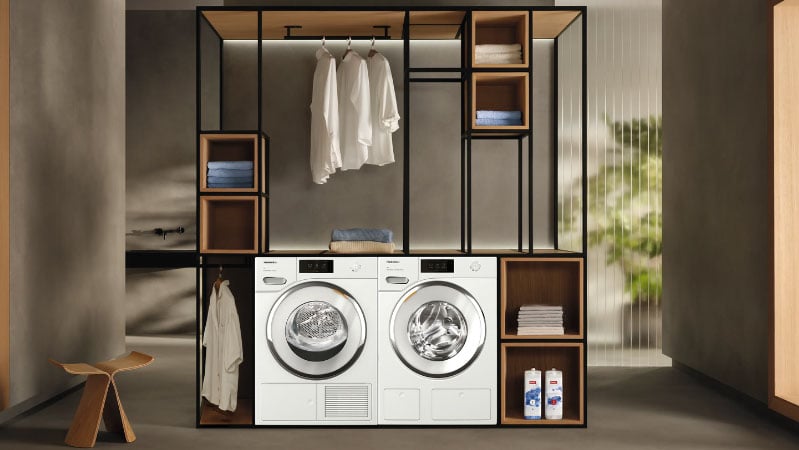
Reliability sounds subjective, but our method is simple.
We look at how many machines we sold and how many required service in the first year. Then we divide the two to get a service rate.
This is the fairest way to measure reliability.
If we send a technician to your home for any functional issue during the first year, it counts as a service call. Customer education calls and damage are not included.
Our service team logged 33,190 service calls last year. We have 35 technicians running 8 to 10 calls a day, five days a week. Another 10 technicians work weekends.
No other company in New England has this level of volume or visibility into what actually breaks.
Manufacturers do not publish failure rates. Review sites do not repair appliances. Lab tests run machines a few times and call it a day.
We see these machines installed in real homes. We see how they behave in tight Boston closets and Cape Cod utility rooms.
We see the difference between a minor issue and a true reliability problem.
Quick Takeaway
Service data is the only real way to compare reliability. The numbers you see in this article reflect actual failures in local homes, not opinions.
🔍 Read more: The Most Reliable Appliance Brands
The Most Reliable Compact Washer Brands for 2026
The following service rates are based on a minimum of 100 products sold and a total sample of over 700 products within 12 months.
| Service Rates | |
| LG | 4.1% |
| Bosch | 5.2% |
| Miele | 7.9% |
| Average Service Rate | 6.1% |
Compact washer service rates are lower this year. LG leads at 4.1 percent, followed by Bosch at 5.2 percent. Both are below the 6.1 percent industry average.
Miele is higher at 7.9 percent, which makes sense.
Their washers have more features, more sensors, and more moving parts. More features usually mean more service in the first year.
Still, all three brands fall in a normal and acceptable range for compact laundry.
Washer Verdict
LG and Bosch are the most reliable compact washers for 2026.
Miele offers the most fabric care and the most features, but that extra complexity increases early service rates.
The Most Common Compact Washer Repairs (And How to Avoid Them)

These are the issues our technicians see most often in Boston, the Cape, and Southern New Hampshire, especially in tight installs where space, airflow, and access are limited.
Even small problems can turn into full shutdowns in a compact setup.
1. Door Lock Problems
This is the number one reason we get service calls on compact washers. Sometimes it is mechanical wear. Other times it is electrical, or detergent buildup blocking the latch.
A compact washer will not run unless the door is fully locked.
That means even a small problem can stop the entire machine.
How to avoid it:
- Keep the door area clean
- Do not slam it shut
- If it starts clicking or hesitating, call for service early
2. Dispenser Leaks

Dispenser leaks usually come from overfilling, using too much detergent, or using the wrong kind altogether.
Compact washers are high-efficiency machines, so they need far less soap than most people think.
Leaks also happen when the dispenser path is clogged or the tray is cracked.
How to avoid it:
- Use only HE detergent, and use less of it
- Clean the dispenser regularly
- Watch for water streaks on the front panel. They are the first sign of a leak.
3. Clogged Hoses
Compact washers have tighter hose setups than full-size units.
That makes kinks and clogs more likely, especially in stacked or closet installs.
We see it often in older Boston homes and Cape cottages where space is limited.
How to avoid it:
- Check that the hoses are not kinked after installation
- Use mesh bags for small items like socks and coins
- Flush the hoses if you have hard water. Mineral buildup is common.
The Most Reliable Compact Dryers for 2026
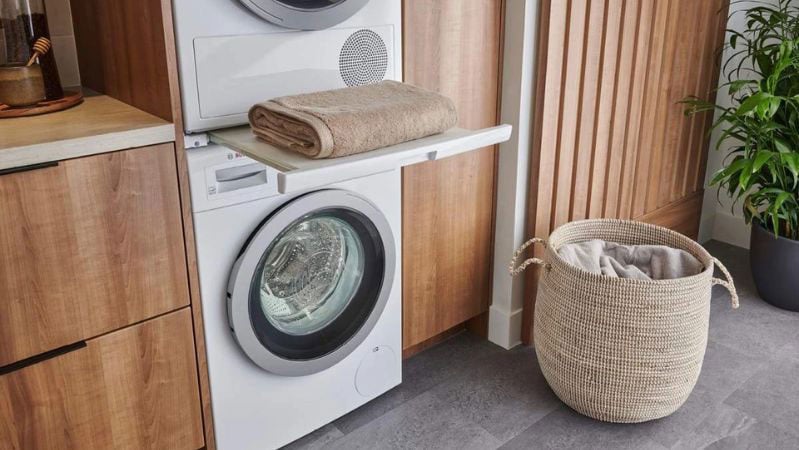
Compact dryers are almost all heat pump models now.
They are efficient and ventless, but they also use closed-loop refrigeration systems with parts like compressors, evaporators, and condensers.
That makes repairs harder and service more specialized.
Here is how each brand performed, based on compact dryers we sold and serviced within the first year.
| Service Rate | |
| Miele | 6.8% |
| LG | 7.1% |
| Bosch | 8.4% |
| Average Service Rate | 7.5% |
Miele leads at 6.8 percent. They have been building heat pump dryers since 2017, and we have seen that experience in the field.
LG is close behind at 7.1 percent. Bosch is slightly higher at 8.4 percent. Both brands use newer heat pump designs, which tend to see more early service calls.
We see the most issues in stacked closets or small Cape utility rooms where airflow is limited and access is tight.
All three brands fall within a normal range for compact dryer repairs, but the skill required to fix them is not the same.
Dryer Verdict
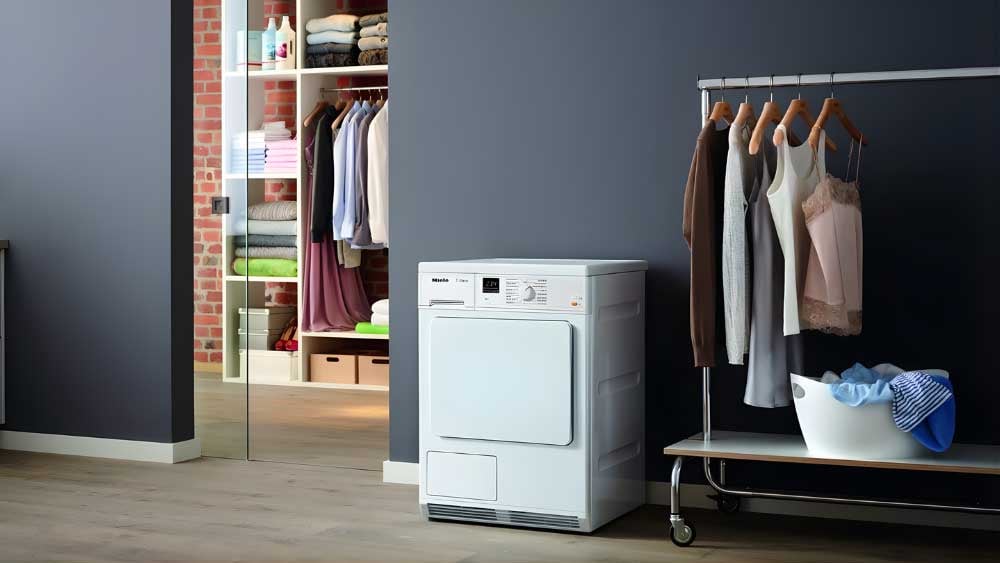
Miele is the most reliable compact dryer for 2026 at 6.8 percent. LG and Bosch are close behind, with newer heat pump systems that see more first-year service.
All three are still better than the average appliance repair rate across all categories, which is about 9.5 percent.
But the real issue is not how often they fail. It is whether your local service company can actually repair a heat pump dryer.
Before we opened our store on Nantucket, the average wait time for a basic service call was four to eight weeks.
For a sealed-system compact dryer, it could stretch to three to six months.
The Real Problem With Heat Pump Dryer Reliability
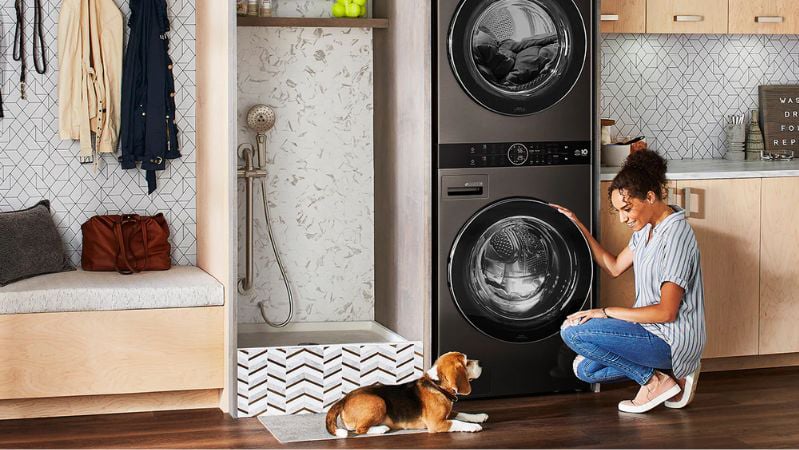
Heat pump dryers are efficient, quiet, and flexible. But they are also the hardest dryers to repair.
Instead of using a heating element like a traditional dryer, they rely on a closed-loop setup with a compressor, evaporator, and condenser, the same components found in a refrigerator.
 Together, these parts make up what is called a heat pump dryer.
Together, these parts make up what is called a heat pump dryer.
The problem is that most dryer technicians are not trained to work on this kind of system.
And most refrigeration techs do not repair dryers. That creates a service gap.
Replacement parts are also more specialized.
If something breaks, the repair can take days or even weeks, not because the machine fails more often, but because fewer people know how to fix it.
Reliability is not just about failure rates. It is about whether someone local can fix the problem fast.
🔍 Read more: Are Heat Pump Dryers Reliable?
Combo Washer-Dryers: Smart in Small Spaces, Risky Long-Term
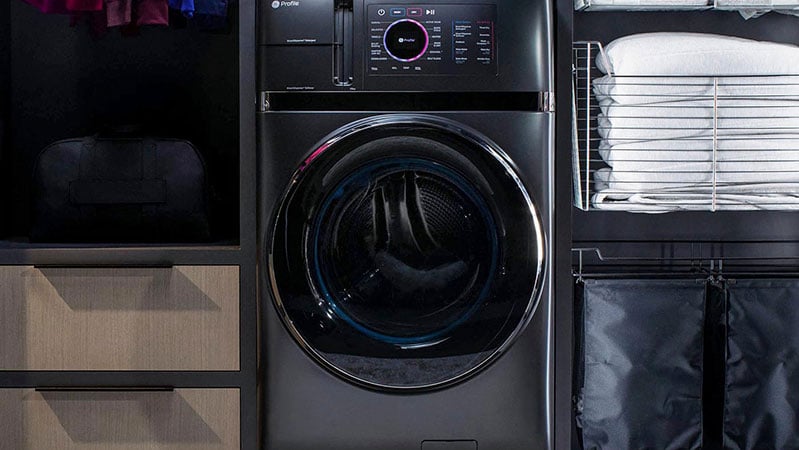
Combo machines solve real space problems in older homes, apartments, and secondary laundry setups.
When They Make Sense
- You cannot fit two machines.
- Your closet is too narrow for a 24-inch compact set.
- Venting is not possible.
- You do just a few loads per week.
- You want a set-it-and-forget-it option.
When They Don’t
- You do frequent or heavy laundry.
- You need faster dry times.
- You have enough space for a separate set.
Early Reliability Data
| Service Rate | |
| GE Profile | 9.3% |
| LG | 13.5% |
| Samsung | N/A (Too New) |
| Average | 12.4% |
The Real Risk: Lint
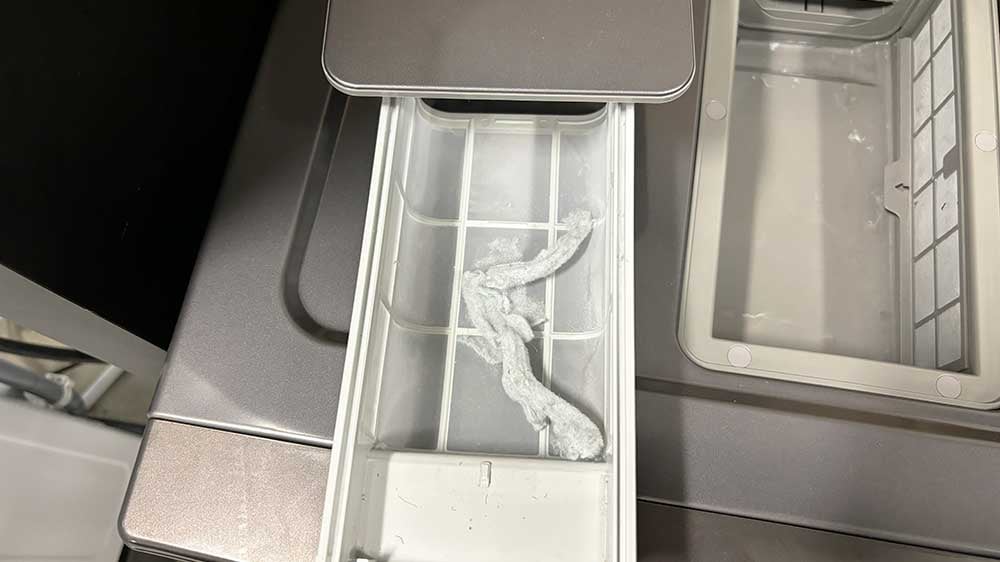
If lint gets inside the machine, it becomes almost impossible to service. The blower and duct areas are packed tightly, and most techs cannot access them.
Combo Verdict
LG and GE Profile are your safest choices for 2026.
Combo units are not for everyone. Dry times are longer. Maintenance matters more.
If lint gets inside the machine, it can turn into an almost impossible service call.
And while it is convenient to put something in dirty and have it come out clean and dry, a full-size set will wash at least twice as fast and handle nearly twice the laundry in the same time.
🔍 Read more: Are Combo Washers & Dryers Reliable?
How Long Will a Compact Washer or Dryer Last?

Most compact washers and dryers last between six and ten years, depending on how often you run them.
Laundry is one of the most used appliances in the home, second only to your refrigerator, and it takes a beating.
To answer the question directly, we asked Paul Macdonald, the service coordinator and trainer for half of the independent appliance dealers in the country.
He was also our service manager for ten years.
What causes early failure:
- Overloading the drum
- Using too much detergent
- Dryers running with limited airflow
- Tight installs that trap heat
- Skipping basic cleaning or hose checks
How to make them last longer:
- Clean the lint filter every time
- Use the right detergent, and less of it
- Check the hoses once or twice a year
- Do not overload
- Leave the washer door open between loads if it is in a closet
Heat pump dryers can last longer because they run cooler, but they are also harder to repair when something does go wrong.
Verdict
Compact laundry holds up well if you use it right.
Expect six to ten years, maybe more if you take care of it.
The biggest factor is not the brand. It is how often you run it, and how you treat it.
Conclusion
Compact laundry is reliable as long as the machines are installed correctly and the space is set up for them.
The biggest problems we see are electrical mismatches, stacked installs without the right kits, and heat pump dryers placed in tight closets without airflow.
Here is what matters most:
- All three major brands fall in a normal reliability range.
- LG is the most reliable washer at 4.1 percent.
- Miele is the most reliable dryer at 6.8 percent.
- Bosch sits right in the middle for washers and dryers.
Miele washers have more features and a different electrical system. They use two 120-volt lines, one for the washer and one for the dryer.
More features mean more to repair, which explains their higher washer service rate.
Heat pump dryers fail less often but take longer to repair. The sealed system is harder to diagnose, and fewer techs know both refrigeration and laundry.
Always confirm who services heat pumps in your area.
Electrical planning matters more than brand. Miele uses two 120-volt lines. LG and Bosch use 120 volts for the washer and 240 volts for the dryer.
Most failed installs come from getting this wrong.
Combo units are reliable so far, but maintenance is critical. LG and GE Profile test well. But you must remove lint constantly.
If lint gets deep into the machine, it is almost impossible to service.
Verdict
You can buy any of these brands with confidence if the electrical is correct and you have real heat pump service coverage in your area.
FAQs
Answers to the most commonly asked questions about compact washers.
✅ Are compact washers and dryers reliable?
Yes. Reliability is similar across LG, Bosch, and Miele. LG is the most reliable washer. Miele is the most reliable dryer. All fall within a normal range for compact laundry.
🧰 Why do compact washers have more service calls than full-size?
Compact washers fit more features into a smaller space. They also run in tighter closets with less airflow, which adds strain. Full-size front loaders are still the most reliable overall.
🗓️ How long do compact washers and dryers last?
Most last 6 to 10 years. Heat pump dryers can last longer, but repairs take more skill and time because of the closed-loop system.
⏱️ Do heat pump dryers take too long to dry?
Heat pump dryers do take longer because they work at lower temperatures. Some models are slower than others. Most loads take 90 minutes to two hours, depending on the fabric and the machine.
🧺 Are combo washers and dryers reliable?
LG and GE Profile combos test well so far. But you must remove lint regularly. If lint gets deep into the machine, most techs can’t reach it. That’s the biggest long-term risk.
Additional Resources
Download the Yale Compact Laundry Buying Guide with specs, features, and buying tips for every major brand. Well over 1 million people have read a Yale Guide.
Related Articles:
Most Reliable Appliances Series:
- Most Reliable Appliance Brands
- Most Reliable Counter-Depth French Door Refrigerators
- Most Reliable Dishwashers
- Most Reliable Front Load Washers
- Most Reliable Top Load Washers
- Most Reliable Compact Washers
- Most Reliable Gas Cooktops
- Most Reliable Induction Cooktops
- Most Reliable Electric Ranges
- Most Reliable Induction Ranges
- Most Reliable Freestanding Gas Ranges
- Most Reliable Professional Gas Ranges
- Most Reliable Wall Ovens
Why Should You Trust Us?
It seems that every appliance review has nothing but glowing comments about almost every product, yet you read customer reviews and they are almost universally bad.
We are here to fill in the disconnect. We'll give you the best features, and the drawbacks as well, including reliability based on over 37,000 calls performed by our service team just last year. Our goal is to give you ALL the information so you know what's right for you.
Please consider subscribing or adding to the conversation in the comments below. We appreciate you stopping by.
Steve Sheinkopf is the third-generation CEO of Yale Appliance and a lifelong Bostonian. He has over 38 years of experience in the appliance industry, and he is a trusted source of information for consumers on how to buy and repair appliances.
Steve has also been featured in numerous publications, including the
New York Times,
Consumer Reports,
The Boston Globe,
Bloomberg Radio, the
New York Post,
The Wall Street Journal, and
Entrepreneur, for his knowledge of how to buy appliances and appliance repair.
Steve is passionate about helping consumers find the best appliances for their needs, and he is always happy to answer questions and provide advice. He is a valuable resource for consumers who are looking for information on appliance buying, repair, and maintenance.
Despite being the worst goalie in history, Steve is a fan of the Bruins and college hockey, loves to read, and is a Peloton biker. The love of his life is his daughter, Sophie.
A Note About Pricing
Pricing on this blog is for reference only and may include time sensitive rebates. We make every attempt to provide accurate pricing at time of publishing. Please call the stores for most accurate price.


